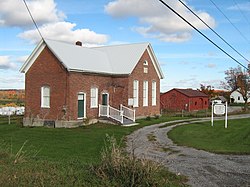Geography
The town occupies the southwest corner of Franklin County, bordered to the south by Chittenden County. The western border of the town is within Lake Champlain and its St. Albans Bay. St. Albans, the Franklin County seat, is to the north. U.S. Route 7 passes through the town, as does Interstate 89, which crosses US-7 at Exit 18 in the southeast part of town. Both highways lead north to St. Albans and south to Burlington.
According to the United States Census Bureau, the town has a total area of 45.2 square miles (117.1 km2), of which 39.3 square miles (101.9 km2) is land and 5.9 square miles (15.3 km2), or 13.03%, is water. [5] The Lamoille River crosses the southeast corner of the town.
Demographics
Historical population| Census | Pop. | Note | %± |
|---|
| 1790 | 340 | | — |
|---|
| 1800 | 1,068 | | 214.1% |
|---|
| 1810 | 1,760 | | 64.8% |
|---|
| 1820 | 1,703 | | −3.2% |
|---|
| 1830 | 1,897 | | 11.4% |
|---|
| 1840 | 2,106 | | 11.0% |
|---|
| 1850 | 2,686 | | 27.5% |
|---|
| 1860 | 1,547 | | −42.4% |
|---|
| 1870 | 1,603 | | 3.6% |
|---|
| 1880 | 1,504 | | −6.2% |
|---|
| 1890 | 1,282 | | −14.8% |
|---|
| 1900 | 1,280 | | −0.2% |
|---|
| 1910 | 1,090 | | −14.8% |
|---|
| 1920 | 1,075 | | −1.4% |
|---|
| 1930 | 1,090 | | 1.4% |
|---|
| 1940 | 1,008 | | −7.5% |
|---|
| 1950 | 1,055 | | 4.7% |
|---|
| 1960 | 1,079 | | 2.3% |
|---|
| 1970 | 1,711 | | 58.6% |
|---|
| 1980 | 2,818 | | 64.7% |
|---|
| 1990 | 3,753 | | 33.2% |
|---|
| 2000 | 4,375 | | 16.6% |
|---|
| 2010 | 4,515 | | 3.2% |
|---|
| 2020 | 4,845 | | 7.3% |
|---|
|
As of the census [2] of 2000, there were 4,375 people, 1,484 households, and 1,231 families residing in the town. The population density was 110.8 people per square mile (42.8/km2). There were 1,654 housing units at an average density of 41.9 per square mile (16.2/km2). The racial makeup of the town was 98.31% White, 0.25% African American, 0.16% Native American, 0.25% Asian, 0.02% Pacific Islander, 0.23% from other races, and 0.78% from two or more races. Hispanic or Latino of any race were 0.57% of the population.
There were 1,484 households, out of which 46.2% had children under the age of 18 living with them, 72.1% were couples living together and joined in either marriage or civil union, 7.4% had a female householder with no husband present, and 17.0% were non-families. 12.3% of all households were made up of individuals, and 4.2% had someone living alone who was 65 years of age or older. The average household size was 2.94 and the average family size was 3.20.
In the town, the population was spread out, with 31.2% under the age of 18, 5.9% from 18 to 24, 34.1% from 25 to 44, 22.7% from 45 to 64, and 6.1% who were 65 years of age or older. The median age was 34 years. For every 100 females, there were 101.7 males.
The median income for a household in the town was $54,156, and the median income for a family was $59,712. Males had a median income of $37,294 versus $26,090 for females. The per capita income for the town was $20,888. About 1.9% of families and 3.8% of the population were below the poverty line, including 2.8% of those under age 18 and 9.0% of those age 65 or over.
This page is based on this
Wikipedia article Text is available under the
CC BY-SA 4.0 license; additional terms may apply.
Images, videos and audio are available under their respective licenses.



